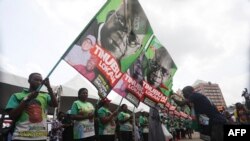Christian groups in Nigeria are criticizing the ruling All Progressives Congress Party (APC) for choosing Muslim candidates to run in next year's election for both president and vice president.
Past presidential tickets have been mixed, with one Muslim and one Christian, to reflect Nigeria's religious population, which is just over half Muslim.
Among religious groups criticizing the selection is the Christian Association of Nigeria. In a statement this week, CAN said the selection portrayed insensitivity toward the collective unity of the country, citing insecurities and a recent wave of attacks on churches.
The association expressed concerns that the issues could escalate if there isn’t proper representation in the corridors of power.
On Sunday, the ruling party's presidential flag bearer, Bola Ahmed Tinubu, a Muslim, named former Borno state Governor Kashim Shettima, also a Muslim, as his running mate.
The APC said the selection was based on competence and not religious sentiments.
"We're not selfish," CAN spokesperson Adebayo Oladeji told VOA. "We're not saying he should pick a pastor or one of our officials. What we're saying is go for a Christian to balance it. It's for unity, peace and development of this country. The country has been polarized under [President Muhammadu] Buhari. Look at the country today. Priests are being kidnapped. Churches are being attacked."
Despite the fact that Nigeria's population is about equally divided between Christians and Muslims, Christian leaders have complained for years about being sidelined when top political appointments are made.
Attacks on churches noted
Since last month, Christian groups have renewed criticism of authorities, saying they have turned a blind eye to a spate of attacks on Christians and churches.
But the Nigerian Supreme Council for Islamic Affairs (NSCIA) rejected claims that Christians had been marginalized and told VOA the council does not comment on political issues.
Ibrahim Aselemi, who leads the media and communications unit of the NSCIA, said, "It is a purely political matter, so that's why we don't want to comment on it. Look at the southern states. It's always been Christian. Christian tickets for all the state governors. The council has not made any comments."
Some citizens, like Abuja resident Meshach Iko, are also criticizing Tinubu's nomination of Shettima,
"Nigeria is not a country that is being dominated by a single religion," Iko said. "For a candidate of his kind to only consider one part of the religion in the country is not really a good idea."
Political analyst Rotimi Olawale said the religion of candidates should not be a setback.
"In my own perspective, it's not important what religion the candidates subscribe to," Olawale said. "And I think for anybody who's concerned about that, they have the opportunity to vote for or against them at the polls."
Presidential and parliamentary elections take place next February 25 and March 11.
CAN said the decision is left for Nigerians to make when they vote.
But many local churches across the country have been mobilizing members and urging them to get their voter cards and use them wisely when the time comes.
